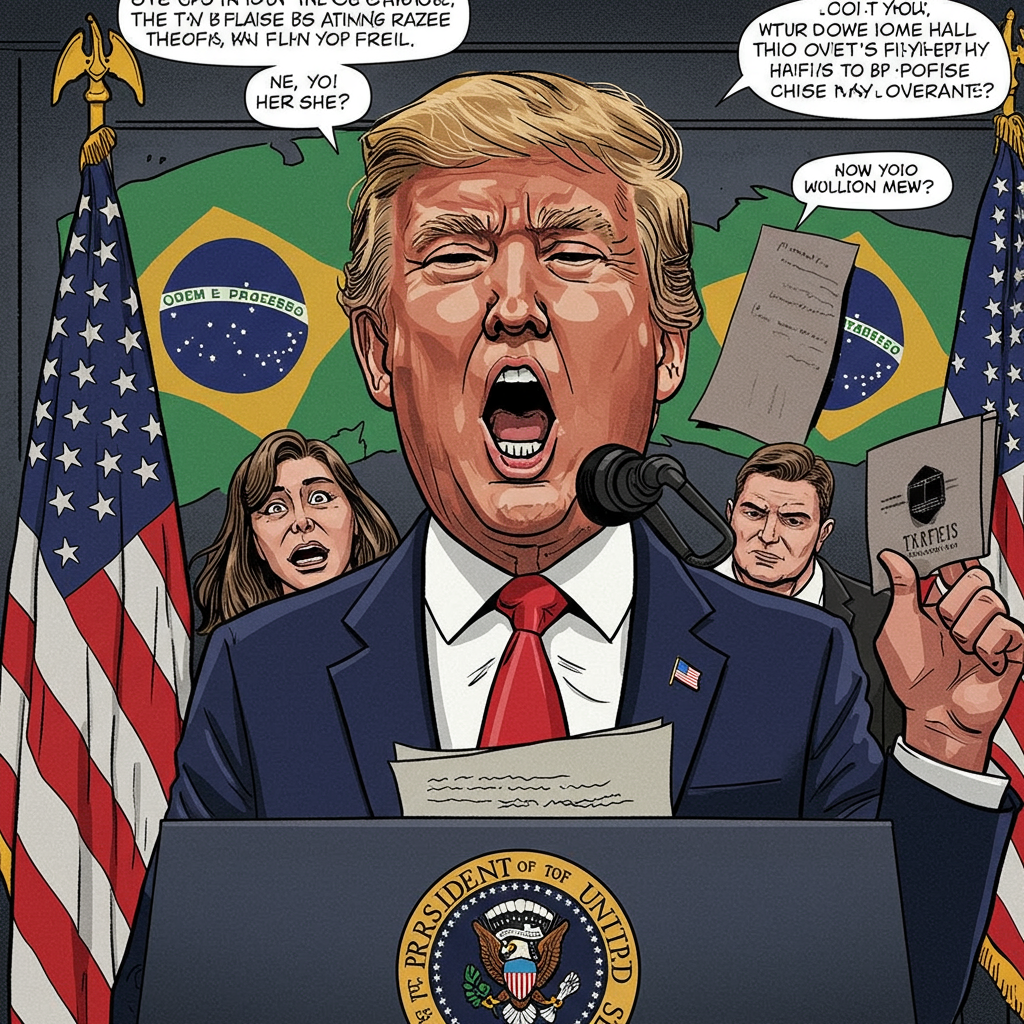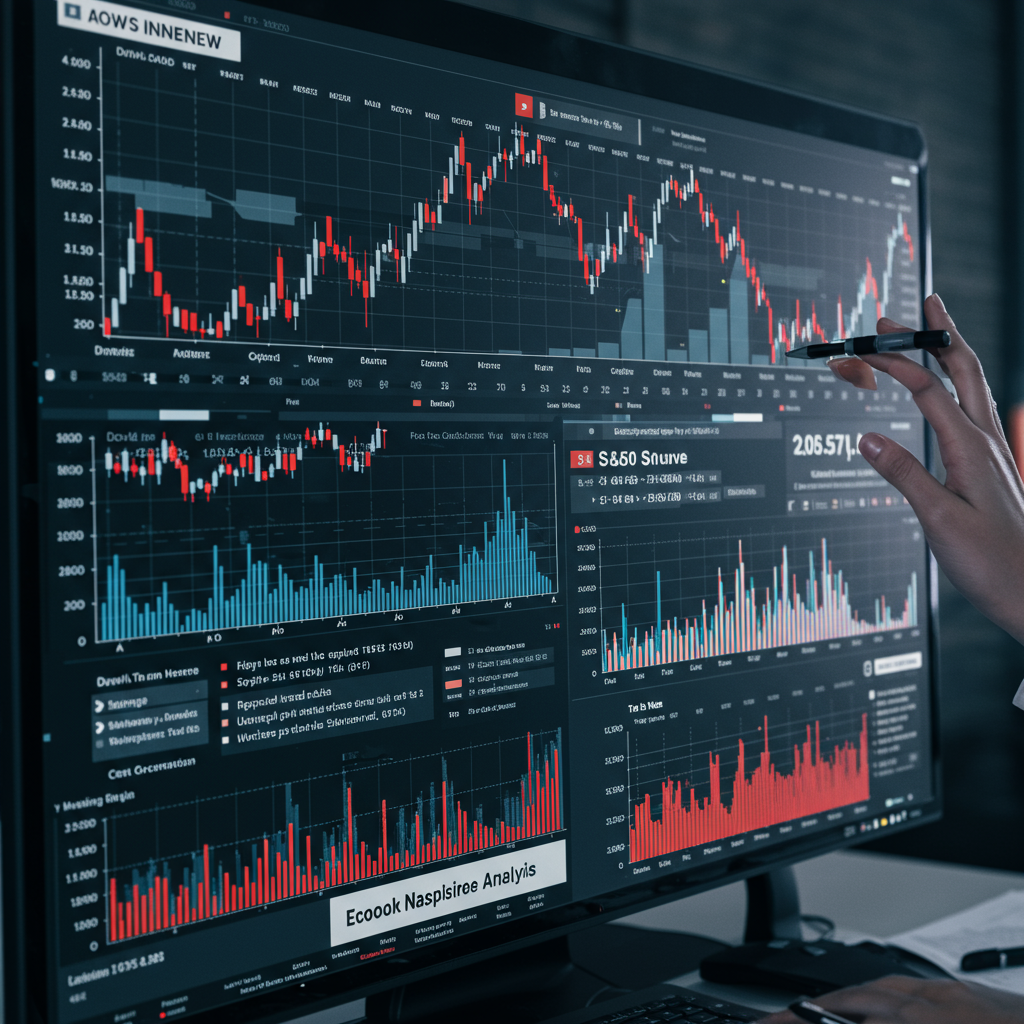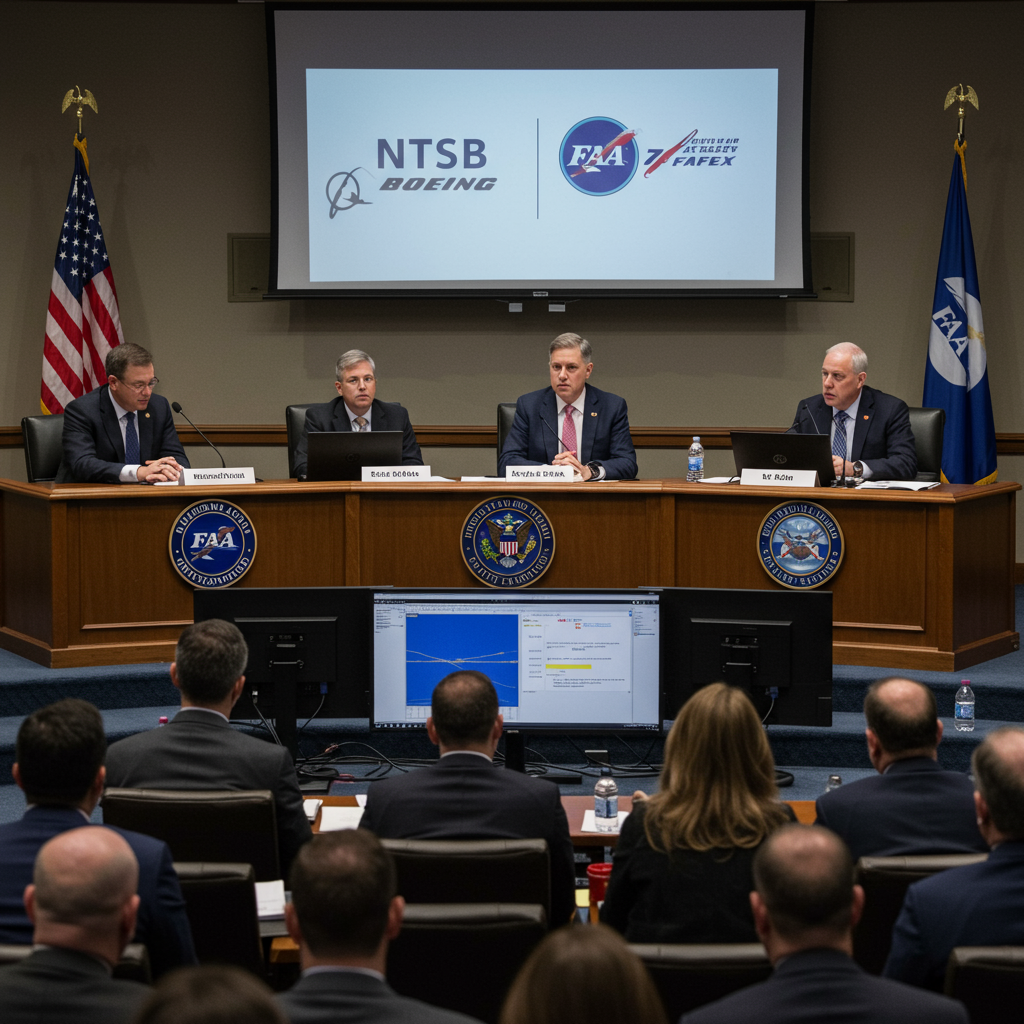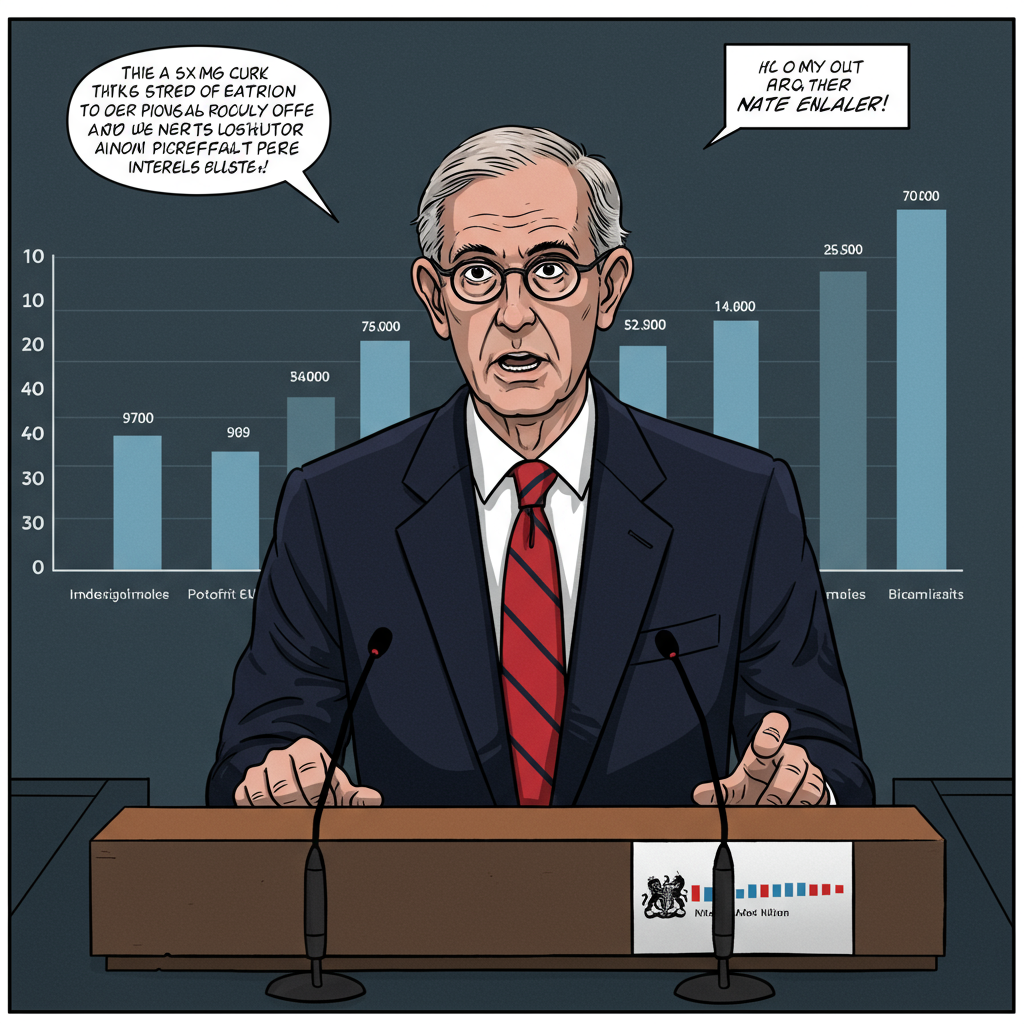President Donald Trump sent a message Wednesday that landed like a grenade in Brazil. This unexpected move plunged the relationship between the two major countries into a new low. Trump pledged to impose tariffs on Brazil, potentially as high as 50%.
His stated reasons were sharp accusations. Trump claimed Brazil was carrying out “attacks” on U.S. technology companies. He also alleged Brazil was conducting a “witch hunt” against former President Jair Bolsonaro. Bolsonaro, a far-right figure and long-time Trump ally, faces prosecution over his alleged role in a plot to overturn the 2022 Brazilian election.
Tariffs as Political Weapons
This action follows recent political sparring between Trump and Brazil’s current president, Luiz Inácio Lula da Silva. It further strained an already tense dynamic. Trump had previously threatened members of the BRICS group with tariffs. Brazil is part of this bloc. Trump accused these nations of taking anti-American positions. The BRICS group includes India, Russia, and China and recently expanded to include Iran. It was founded partly to counterbalance U.S. influence globally.
Lula reacted strongly to Trump’s tariff threat. He posted on X (formerly Twitter). Lula asserted, “Brazil is a sovereign nation with independent institutions and will not accept any form of tutelage.” Since returning to office in January, Trump has initiated a wide-ranging program of tariffs, or import taxes. He argues these measures will boost U.S. manufacturing and safeguard jobs. However, he has also clearly used them to pursue political objectives. This appears to be the case with Brazil.
Lula’s government indicated it would retaliate. They would likely impose equal tariffs on American goods. Uncertainty remains about how this would be implemented. There are also questions about Brazil’s economic capacity to handle an escalating trade conflict. Many Brazilians are now asking why their country was targeted and how this situation will unfold.
The Deep Bolsonaro Connection
The U.S. actually buys less from Brazil than it sells. This trade imbalance theoretically aligns with Trump’s trade agenda favoring countries where the U.S. has a surplus. Given this context, many Brazilian analysts and politicians saw the tariff threat differently. They viewed it as an overt political gesture of support for Jair Bolsonaro. Trump’s letter underscored this interpretation. It harshly criticized the Brazilian government. It also specifically referenced Bolsonaro’s ongoing trial in the Supreme Court related to an alleged coup attempt two years prior.
Brazilian politicians had anticipated some level of support for Bolsonaro from Trump. However, the scale of this intervention, using trade policy, surprised them. On January 8, 2023, hundreds of Bolsonaro’s supporters stormed Brazil’s Congress, Supreme Court, and presidential palace. This was an apparent attempt to overturn the election Lula won months earlier. Bolsonaro denies any connection to these events. Many saw this as a Brazilian parallel to the attacks on the U.S. Capitol by Trump’s supporters two years earlier. Trump also faced investigation after the U.S. riot. He has condemned those who sought to prosecute him.
Bolsonaro’s supporters had sought Trump’s backing for months. His son, Eduardo Bolsonaro, took a leave from his position in Brazil’s Congress. He moved to the United States. A regular visitor at Mar-a-Lago, Eduardo has actively worked to rally support for his father. He has engaged with Trump’s inner circle and the broader MAGA movement.
Framing the Legal Challenges
Trump’s message also accused the Brazilian government of “insidious attacks on Free Elections, and the fundamental Free Speech Rights of Americans.” He cited the censorship of “US Social Media platforms.” This likely refers to Brazil’s Supreme Court rulings. As part of ongoing investigations into disinformation spread within Brazil, the Court has ordered the blocking of several social media accounts. Many belonged to Bolsonaro’s supporters. U.S. conservative figures, including some in Congress, have reacted angrily to these rulings. Florida Representative Maria Elvira Salazar even introduced a bill (H.R. 9605). It would allow for the potential cancellation of visas for foreign officials deemed to have threatened U.S. citizens’ free speech.
This situation aligns with a perceived global trend. Right-wing leaders in various countries, like Israel, Romania, and France, have faced legal challenges. Critics frame these prosecutions as politically motivated efforts by the “left” or the judiciary to target opponents. Following a conviction against France’s Marine Le Pen, Elon Musk reacted strongly. He stated it would “backfire” and compared it to Trump’s challenges. Musk claimed the “radical left” abuses the legal system when they cannot win democratically. Trump himself commented on Le Pen’s sentence, noting the ban from office. He remarked, “That sounds like this country,” drawing a parallel to his own legal battles. Legal experts like Eugene Kontorovich at the Heritage Foundation agree. He argues courts are being used globally to remove popular right-wing leaders through prosecutions for “obscure victimless offenses.”
Deeper Motives and Domestic Impacts
While supporting Bolsonaro is a clear motive, Trump’s actions might also stem from other concerns. Brazil’s growing ties with other Southern economies are notable. Its role within the expanding BRICS bloc could be a factor. Brazil recently hosted a BRICS summit. During this meeting, Lula reiterated calls for exploring alternatives to the U.S. dollar for international transactions. This topic has drawn criticism from Trump. Brazil’s Institutional Relations Minister, Gleisi Hoffmann, suggested Trump fears the strengthening of commercial and financial relations in the global south. Brazil is actively helping build these ties. This perspective suggests Trump’s move is not solely about Bolsonaro but also about countering Brazil’s growing influence in a multipolar world. Ironically, the U.S. actually has a trade surplus with Brazil. This fact undermines the standard justification for imposing tariffs based on trade imbalances.
Brazil’s authorities and businesses are currently assessing the potential economic impact of the proposed tariffs. The political consequences are also significant. Trump’s explicit defense of Bolsonaro suggests a political proximity few other Brazilian or Latin American politicians possess. His letter is seen as a powerful endorsement for Bolsonaro. Bolsonaro aims to run for president again, despite being banned until 2030 by Brazil’s top electoral court. Bolsonaro’s allies quickly capitalized on the tariff threat. They suggested the blame lay squarely with President Lula. São Paulo Governor Tarcísio de Freitas, a staunch Bolsonaro ally, stated, “Lula put ideology ahead of economics, and this is the result.”
The Potential for Backfire
However, some analysts and politicians believe Trump’s intervention could ultimately backfire for Bolsonaro. The United States is Brazil’s second most important trade partner, after China. A new round of American tariffs could severely impact sectors closely aligned with Bolsonaro’s political base. Agribusiness is particularly vulnerable. There are growing concerns about the potential effect on Brazilian exports like oranges, coffee, and beef to the U.S. Hurting these key constituencies might not play into Bolsonaro’s hands.
Instead, Trump’s tariff threat could inadvertently benefit Lula. Lula has struggled with falling popularity rates and difficulties navigating Congress. A poll in May indicated that 55% of Brazilians disapprove of Trump. New tariffs are unlikely to improve that sentiment. Following Trump’s announcement, Lula and the Brazilian left adopted a nationalist stance. They emphasized sovereignty. They attempted to blame Bolsonaro for the potential economic fallout. Crucially, reactions among centrist politicians have also been largely negative. Senator Alessandro Vieira, usually critical of Lula, wrote, “No citizen… can tolerate foreign aggression against Brazil.”
Analysts argue this widespread condemnation could generate a “rally-around-the-flag” effect for Lula. This would provide a much-needed political boost. Oliver Stuenkel, a professor at FGV and researcher at the Carnegie Endowment, suggests even Lula’s critics might view Trump’s move as an attack on national sovereignty and the independence of the judiciary. The interference has fostered rare unity in Brazil’s often-divided political landscape. Even media outlets critical of Lula have condemned Trump’s actions as unacceptable. An editorial in O Estado de S. Paulo described it as “a mafia thing.” It surprisingly endorsed Lula’s reaction as correct.
Legal and Political Fallout
The details emerging from the Brazilian Federal Police investigation into the alleged coup plot are severe. They allege that high-ranking military figures planned to assassinate incoming President Lula, Vice President Geraldo Alckmin, and Supreme Court Justice Alexandre de Moraes. Bolsonaro and 36 others face formal accusations. Charges include attempted coup d’état, violent abolition of democracy, and participation in a criminal organization. All the accused deny wrongdoing.
These charges significantly raise the stakes for Bolsonaro. Beyond the existing ban until 2030 for challenging the voting system, conviction could mean decades in prison. Brazil’s general prosecutor, Paulo Gonet, is expected to take time analyzing police probes. A decision on a formal indictment might not come until 2025. This delay could allow Bolsonaro’s allies time to leverage international support. Eduardo Bolsonaro and groups of pro-Bolsonaro congresspeople have traveled to the U.S. They promote a narrative portraying Brazil under Lula as a totalitarian regime persecuting the opposition, similar to Venezuela.
While direct U.S. pressure might not alter Brazil’s judicial outcomes, analysts question its effectiveness. It could backfire by stiffening resistance to foreign interference. Negotiating over the trial’s outcome is seen by Brazilian analysts as non-negotiable. Brazil would be seen as capitulating. Trump’s stated interest in the trial adds complexity. There are concerns Bolsonaro might attempt to leave Brazil for the U.S. if convicted. His passport has already been seized due to him being perceived as a flight risk. Some speculate Trump’s actions might even be aimed at preparing grounds for potential exile for Bolsonaro later.
Trump’s authority to impose tariffs under the 1977 International Emergency Economic Powers Act faces legal challenges in the U.S. A court ruled in May that Trump exceeded his authority in a related case. Opponents may use the Brazil letter to strengthen their legal arguments against Trump’s tariff authority.
Brazil’s presidential election in October 2026 is still some time away. However, the potential impact of Trump’s move is already being discussed. Some analysts draw comparisons to Canada. There, a right-wing candidate compared to Trump lost recently to a more centrist opponent who campaigned against the U.S. leader. With Bolsonaro barred from running, allies are competing to represent the Brazilian right. Social media debate, often critical of Trump’s move, includes sharing memes of potential Bolsonaro-backed candidates, sometimes linking them to Trump’s MAGA image.
Frequently Asked Questions
Why did Donald Trump threaten tariffs on Brazil?
President Trump cited two main reasons: accusing Brazil of “attacks” on U.S. tech companies (likely referring to judicial orders blocking social media accounts linked to Bolsonaro supporters) and engaging in a “witch hunt” against his ally, former President Jair Bolsonaro, who faces trial for an alleged coup plot. Trump’s move is also seen by some analysts as a political gesture to support Bolsonaro and potentially counter Brazil’s growing role in blocs like BRICS and its efforts to strengthen the Global South.
How did Brazil’s government respond to Trump’s tariff threat?
Brazilian President Lula da Silva firmly rejected the threat, emphasizing Brazil’s sovereignty and independent institutions. He declared Brazil would not accept any external “tutelage.” Lula’s government vowed to retaliate with reciprocal tariffs, threatening to impose a 50% import tax on U.S. goods if Trump follows through on his pledge, citing a recently passed reciprocity law. Lula reportedly ordered Trump’s formal letter to be returned if it physically arrived.
Could Trump’s action help or hurt Jair Bolsonaro in Brazil?
Analysts are divided. The tariff threat is a powerful endorsement that strengthens Bolsonaro’s standing with his base and allies, who blame President Lula for the potential economic fallout. However, the move could backfire. Tariffs could harm key economic sectors like agribusiness that are vital to Bolsonaro’s support base. Additionally, Trump’s interference has united much of Brazil’s political spectrum, including critics of Lula, in condemning the action as an attack on national sovereignty, potentially creating a “rally-around-the-flag” effect that could benefit Lula politically.
Conclusion
Trump’s tariff threat against Brazil has ignited a complex geopolitical firestorm. It intertwines trade policy, domestic politics, and judicial processes in an unprecedented manner. While framed by Trump as a response to attacks on U.S. tech and a defense of his ally Bolsonaro, the move carries multiple layers of potential motivation. It could reflect broader concerns about Brazil’s role in challenging U.S. influence globally.
In Brazil, the reaction is a mix of defiance and concern. Lula’s government has vowed reciprocal action. However, the economic capacity to withstand an escalated trade war remains uncertain. Politically, the situation is even more volatile. While a clear endorsement for Bolsonaro, the move risks alienating key economic supporters and has surprisingly united many Brazilians, across the political spectrum, against perceived foreign interference. This nationalistic pushback could provide a vital political boost for President Lula.
Ultimately, Trump’s intervention introduces significant uncertainty. It impacts not only Brazil’s economic future but also the intricate political landscape ahead of the 2026 elections. The saga highlights the increasing intersection of international trade leverage with domestic political and legal battles in an era of complex global dynamics.




